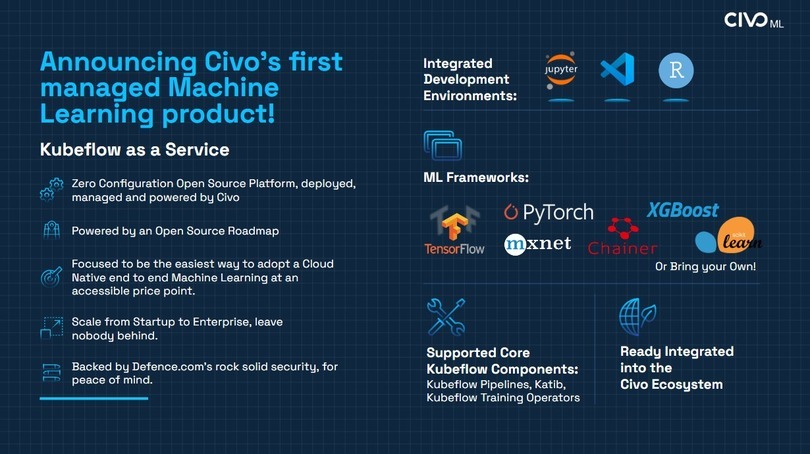As engineers, we tend to pride ourselves on building a production-first mindset and operational excellence.
According to a recent survey, 74% of executives believe that AI will deliver more efficient business processes, while 55% think that AI will help develop new business models and create new products and services. However, the reality is that 85% of ML projects fail to deliver, and 53% of machine learning prototypes don't make it to production. These failures can result in expensive outcomes that don't generate any meaningful results.
Throughout this blog, I will take you through how the widening adoption of machine learning has allowed us to establish a developer-first approach to cloud native technology with the launch of our new machine learning ecosystem, Civo ML.
The skills required to succeed in ML
When we ask people what skills do you need to be successful in a machine learning project, we get some interesting results. Those in machine learning projects will list a wide set of skills from analytics, business engineering, data, mathematics, and statistics. What this creates is a T-shaped jack-of-all-trades individual who will understand all these concepts and bring them together, normally leaning on different people’s expertise when needed.
No matter where your team focuses, if you build an engineering and computing-focused team, you might find weaknesses in other areas, such as mathematics, and vice versa. This is why it is essential to widen the adoption of machine learning to make it accessible to smaller companies with fewer resources.

The widening adoption of ML
The adoption of machine learning is shifting towards smaller companies with less than 200 employees due to the increasing democratization of machine learning and the availability of resources to start and scale ML projects. The entry point for starting an ML project has become more manageable and requires a smaller amount of capital to begin, with many companies now able to tackle ML projects in their seed funding and Series A stages. There has also been a rise in one-person-band ML projects where individuals are building accurate and powerful machine learning models.
This democratization is further supported by the breakdown of economies of scale needed for hyperscaler clouds, serverless ML inference, and hardware acceleration, which are changing the economics of these projects and making them more accessible for smaller companies. This widening adoption of machine learning is a positive development, and with the help of cloud-native technologies, companies of all sizes can now leverage machine learning to gain insights and make data-driven decisions without breaking the bank or losing autonomy.

What is Civo doing differently?
Here at Civo, we believe in taking a developer-first approach to cloud native technology and differentiating ourselves by avoiding proprietary tooling and building a larger, more interoperable ecosystem. Rather than building more barriers to adoption, we want to make machine learning more accessible by lowering the cost of entry for small players and startups.
The current costs and education required to use hyperscaler machine learning platforms are prohibitive… so we aim to streamline that process. By investing in and expanding the cloud native ecosystem, we hope to create a more disruptive and cost-effective pathway for machine learning.
Watch my recent talk at KubeHuddle on how Civo is helping to back cloud native to reduce the cost of machine learning:
Introducing Civo AI
During Civo Navigate NA 2023, we announced Civo AI, our new machine learning ecosystem.
Civo AI aims to make the first venture into machine learning more accessible for companies by providing a cost-effective and user-friendly platform.
Companies can leverage the strengths of cloud-native technology without getting lost in technical complexity, breaking the bank, or sacrificing autonomy. Civo AI is excited to offer a solution that solves the problem of expensive machine learning tools and the steep learning curve that often comes with using hyperscaler machine learning platforms.
Read more about Civo AI by clicking here.

What is next for Civo AI
As part of Civo AI, we are excited to announce the launch of GPU Edge boxes, which will accelerate not only Edge machine learning compute use cases but also hybrid and on-premise implementations. These boxes provide a transparent and protected implementation with added service functionality. Additionally, Civo AI offers fractional GPU use instances that are designed to break down the entry cost for machine learning.
Continue learning more about Civo AIhere.